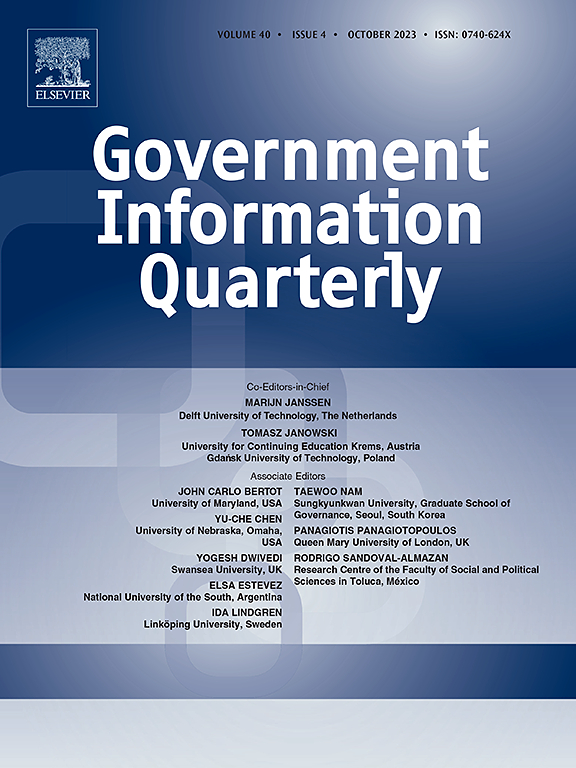Tensions in time-saving technologies: Adjusting work rhythms in the digitalized public sector frontline
IF 10
1区 管理学
Q1 INFORMATION SCIENCE & LIBRARY SCIENCE
引用次数: 0
Abstract
Digital technologies are increasingly being implemented in public sector organizations with the ambition to enhance efficiency by saving employees' time. Frontline workers, who are often described as lacking resources and working under constant time constraints, are continuously confronted with the introduction of new, supposedly time-saving technologies. However, the concept of time and how digital technologies impact frontline workers' use of time in practice are rarely examined explicitly in public administration research. This article foregrounds the concept of time, drawing on qualitative fieldwork in Denmark's public employment services to examine how frontline workers navigate time tensions introduced by supposedly time-saving technologies. The findings reveal that these technologies reinforce tight linear schedules, requiring frontline workers to balance both time delays and time gains. This dynamic necessitates flexible adjustments of work rhythms as employees speed up or slow down their tasks to adjust to the digitalized environment. To understand these temporal tensions—how they are created and handled—this article draws on insights from science and technology studies, applying the distinction between monochronic time—in which events are approached as unfolding sequentially with a focus on one event at a time—and polychronic time, in which events are unpredictable and may unfold simultaneously or in other non-linear ways. Based on our study, we argue for an explicit focus on temporality in public administration literature, offer a conceptual vocabulary to explore it further, and advocate for understanding how time-saving technologies unfold in everyday practice, while acknowledging the coexistence of monochronic and polychronic time orientations in organizations.
省时技术的紧张关系:调整数字化公共部门前线的工作节奏
数字技术越来越多地应用于公共部门机构,目的是通过节省员工的时间来提高效率。一线工人经常被描述为缺乏资源和在持续的时间限制下工作,他们不断面临着新的、据称可以节省时间的技术的引入。然而,在公共行政研究中,时间的概念以及数字技术如何影响一线员工在实践中的时间利用很少得到明确的研究。本文强调了时间的概念,利用丹麦公共就业服务的定性实地调查,研究一线工人如何应对由所谓的节省时间的技术引入的时间紧张。研究结果表明,这些技术加强了紧凑的线性时间表,要求一线工人平衡时间延迟和时间增益。随着员工加快或放慢工作节奏以适应数字化环境,这种动态需要灵活调整工作节奏。为了理解这些时间紧张——它们是如何产生和处理的——本文借鉴了科学和技术研究的见解,应用了单时间时间和多时间时间之间的区别,单时间时间是指事件在同一时间集中于一个事件,按顺序展开,多时间时间是指事件是不可预测的,可能同时展开或以其他非线性方式展开。基于我们的研究,我们主张在公共管理文献中明确关注时间性,提供一个概念性词汇来进一步探索它,并倡导理解节省时间的技术如何在日常实践中展开,同时承认组织中单时性和多时性时间取向的共存。
本文章由计算机程序翻译,如有差异,请以英文原文为准。
求助全文
约1分钟内获得全文
求助全文
来源期刊

Government Information Quarterly
INFORMATION SCIENCE & LIBRARY SCIENCE-
CiteScore
15.70
自引率
16.70%
发文量
106
期刊介绍:
Government Information Quarterly (GIQ) delves into the convergence of policy, information technology, government, and the public. It explores the impact of policies on government information flows, the role of technology in innovative government services, and the dynamic between citizens and governing bodies in the digital age. GIQ serves as a premier journal, disseminating high-quality research and insights that bridge the realms of policy, information technology, government, and public engagement.
 求助内容:
求助内容: 应助结果提醒方式:
应助结果提醒方式:


